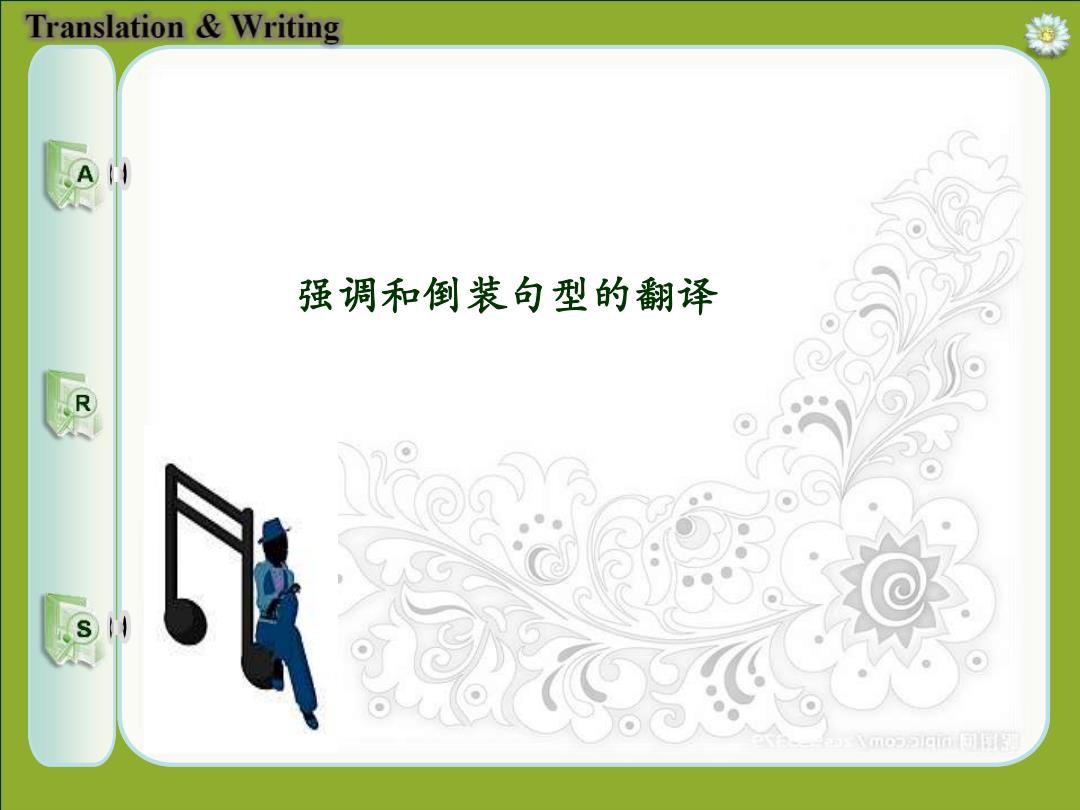
Translation Writing 强调和倒装句型的翻译 amo2am间同
强调和倒装句型的翻译
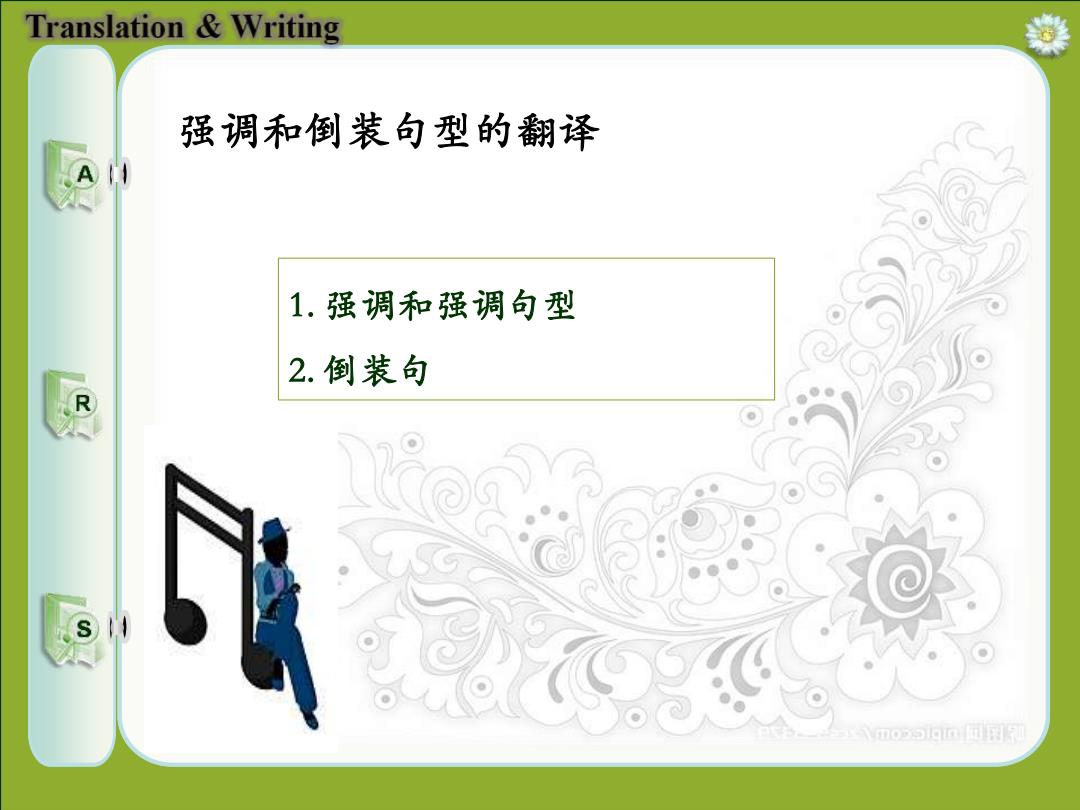
Translation Writing 强调和倒装句型的翻译 1.强调和强调句型 R 2.倒装句 mo3an同国
1. 强调和强调句型 2. 倒装句 强调和倒装句型的翻译
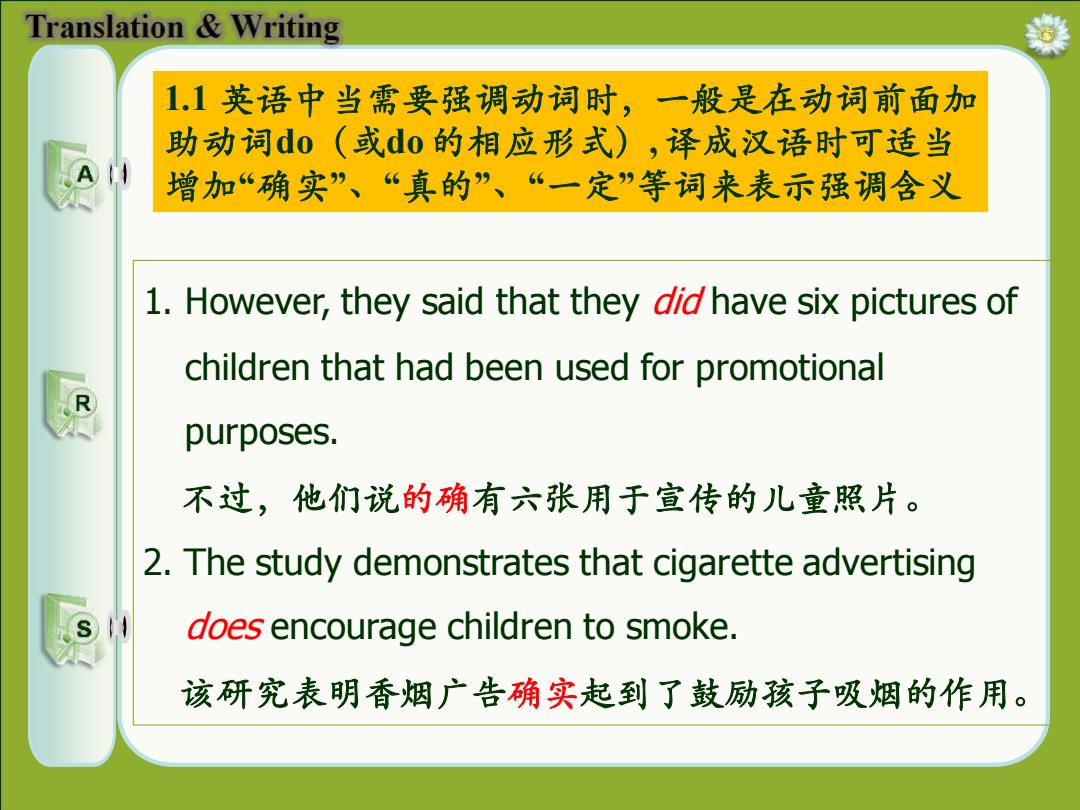
Translation Writing 1.1英语中当需要强调动词时,一般是在动词前面加 助动词d0(或do的相应形式),译成汉语时可适当 增加“确实”、“真的”、“一定”等词来表示强调含义 1.However,they said that they did have six pictures of children that had been used for promotional purposes. 不过,他们说的确有六张用于宣传的儿童照片。 2.The study demonstrates that cigarette advertising does encourage children to smoke. 该研究表明香烟广告确实起到了鼓励孩子吸烟的作用
1. However, they said that they did have six pictures of children that had been used for promotional purposes. 不过,他们说的确有六张用于宣传的儿童照片。 2. The study demonstrates that cigarette advertising does encourage children to smoke. 该研究表明香烟广告确实起到了鼓励孩子吸烟的作用。 1.1 英语中当需要强调动词时,一般是在动词前面加 助动词do(或do 的相应形式), 译成汉语时可适当 增加“确实” 、 “真的” 、 “一定”等词来表示强调含义
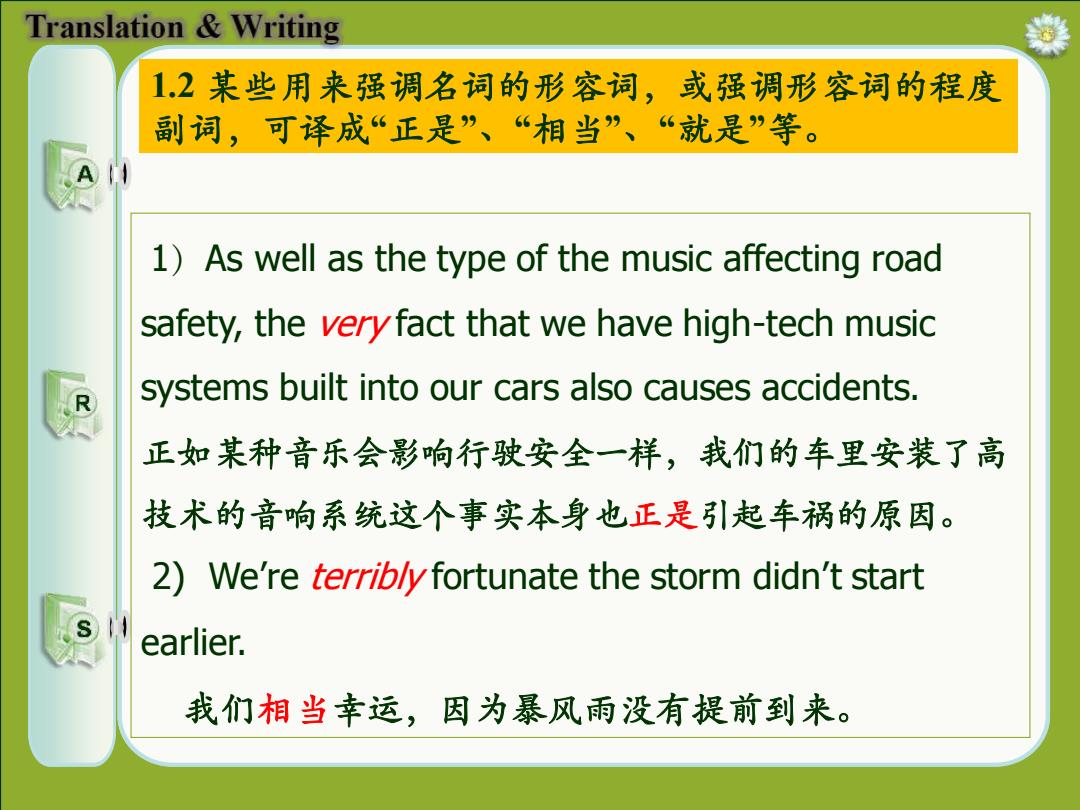
Translation Writing 12某些用来强调名词的形容词,或强调形容词的程度 副词,可译成“正是”、“相当”、“就是”等。 1)As well as the type of the music affecting road safety,the veryfact that we have high-tech music systems built into our cars also causes accidents. 正如某种音乐会影响行驶安全一样,我们的车里安装了高 技术的音响系统这个事实本身也正是引起车祸的原因。 2)We're terrib/y fortunate the storm didn't start earlier. 我们相当幸运,因为暴风雨没有提前到来
1.2 某些用来强调名词的形容词,或强调形容词的程度 副词,可译成“正是” 、 “相当” 、 “就是”等。 1)As well as the type of the music affecting road safety, the very fact that we have high-tech music systems built into our cars also causes accidents. 正如某种音乐会影响行驶安全一样,我们的车里安装了高 技术的音响系统这个事实本身也正是引起车祸的原因。 2) We’re terribly fortunate the storm didn’t start earlier. 我们相当幸运,因为暴风雨没有提前到来
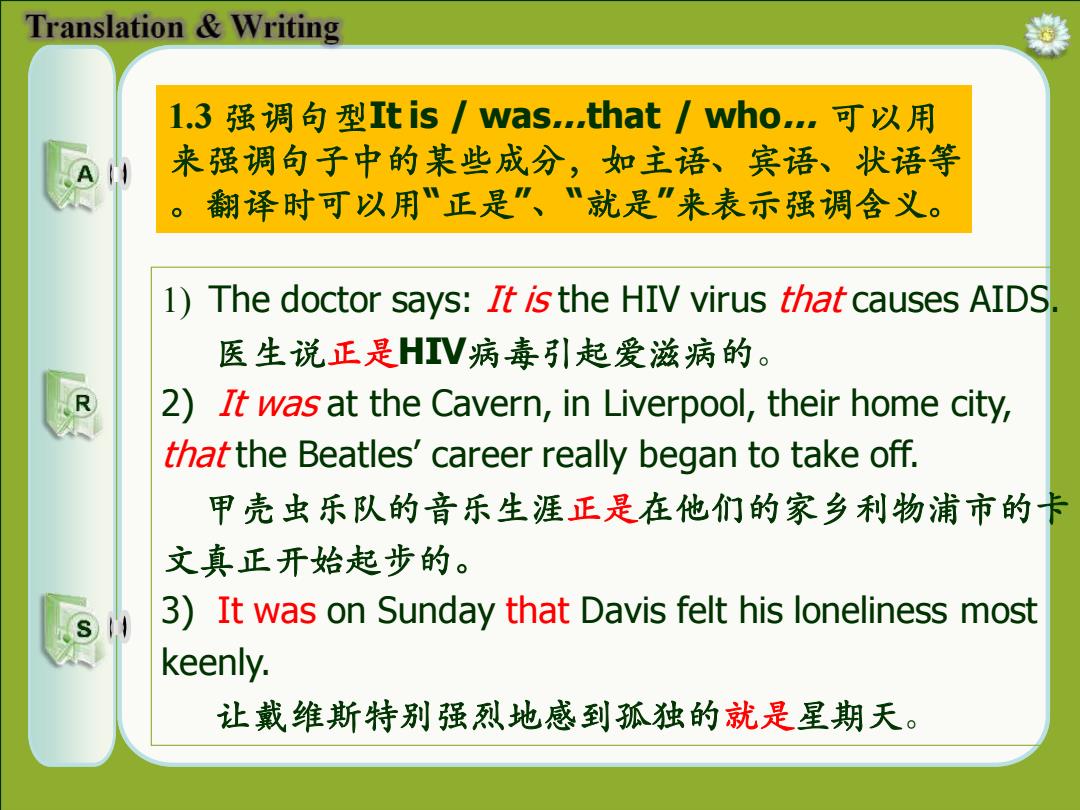
Translation Writing 1.3强调句型Itis/was.that/who,可以用 来强调句子中的某些成分,如主语、宾语、状语等 翻译时可以用"正是”、“就是”来表示强调含义。 1)The doctor says:It is the HIV virus that causes AIDS. 医生说正是HIV病毒引起爱滋病的。 2)It was at the Cavern,in Liverpool,their home city, that the Beatles'career really began to take off. 甲壳虫乐队的音乐生涯正是在他们的家乡利物浦市的卡 文真正开始起步的。 3)It was on Sunday that Davis felt his loneliness most keenly. 让戴维斯特别强烈地感到孤独的就是星期天
1.3 强调句型It is / was…that / who… 可以用 来强调句子中的某些成分,如主语、宾语、状语等 。翻译时可以用“正是” 、 “就是”来表示强调含义。 1) The doctor says: It is the HIV virus that causes AIDS. 医生说正是HIV病毒引起爱滋病的。 2) It was at the Cavern, in Liverpool, their home city, that the Beatles’ career really began to take off. 甲壳虫乐队的音乐生涯正是在他们的家乡利物浦市的卡 文真正开始起步的。 3) It was on Sunday that Davis felt his loneliness most keenly. 让戴维斯特别强烈地感到孤独的就是星期天
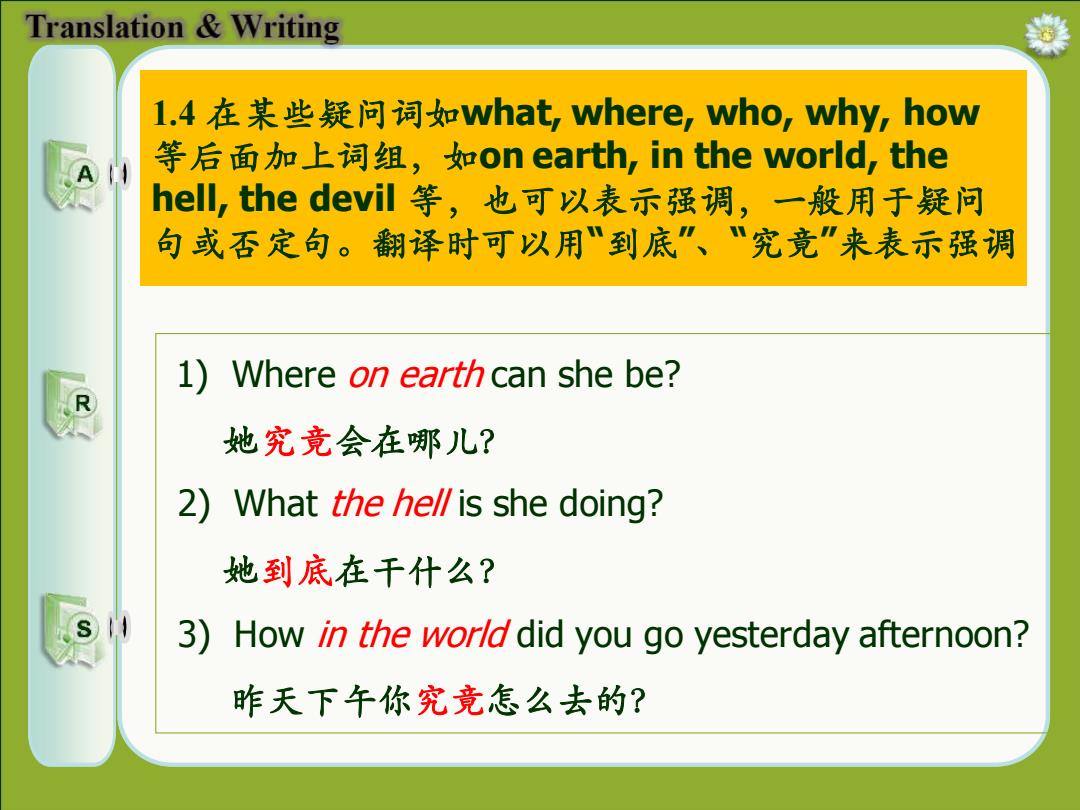
Translation Writing 1.4在某些疑问词如what,where,who,why,hoW 等后面加上词组,如on earth,in the world,he hel,the devil等,也可以表示强调,一般用于疑问 句或否定句。翻译时可以用"到底”、“究竞”来表示强调 1)Where on earth can she be? 她究竟会在哪儿? 2)What the hell is she doing? 她到底在干什么? 3)How in the world did you go yesterday afternoon? 昨天下午你究竞怎么去的?
1.4 在某些疑问词如what, where, who, why, how 等后面加上词组,如on earth, in the world, the hell, the devil 等,也可以表示强调,一般用于疑问 句或否定句。翻译时可以用“到底” 、 “究竟”来表示强调 1) Where on earth can she be? 她究竟会在哪儿? 2) What the hell is she doing? 她到底在干什么? 3) How in the world did you go yesterday afternoon? 昨天下午你究竟怎么去的?
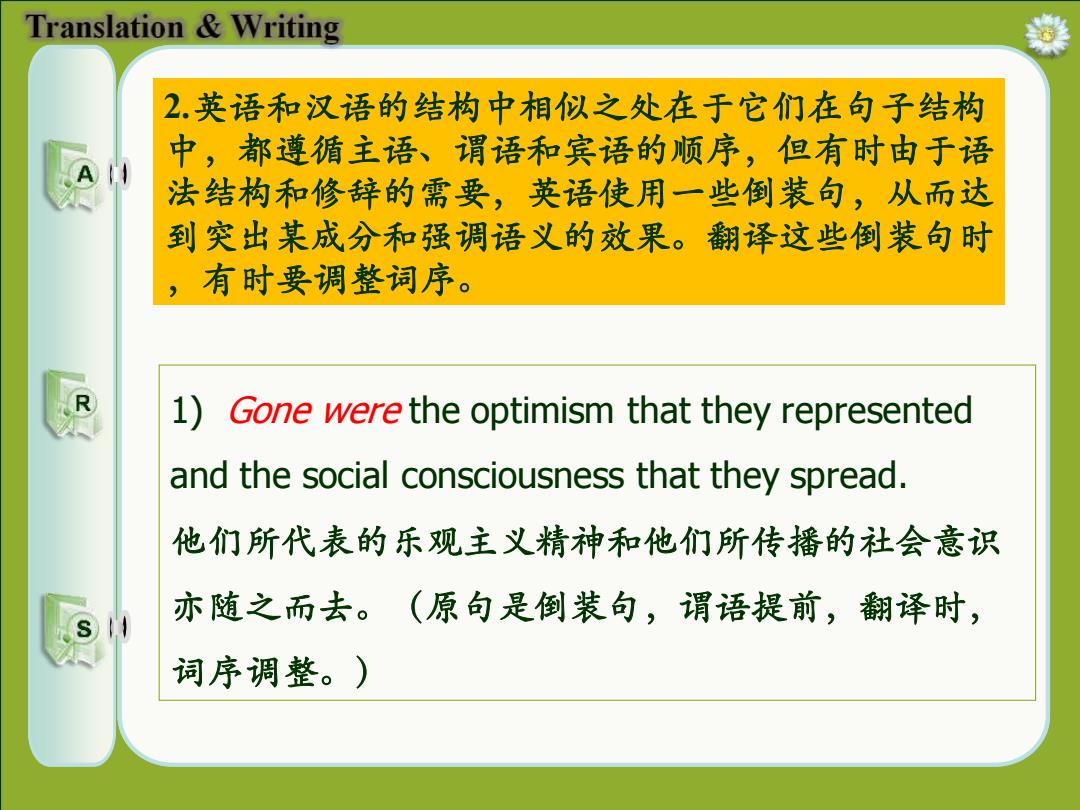
Translation Writing 2.英语和汉语的结构中相似之处在于它们在句子结构 中,都遵循主语、谓语和宾语的顺序,但有时由于语 法结构和修锌的需要,英语使用一些倒装句,从而达 到突出某成分和强调语义的效果。翻译这些倒装句时 ,有时要调整词序。 1)Gone were the optimism that they represented and the social consciousness that they spread. 他们所代表的乐观主义精神和他们所传播的社会意识 亦随之而去。(原句是倒装句,谓语提前,翻译时, 词序调整。)
1) Gone were the optimism that they represented and the social consciousness that they spread. 他们所代表的乐观主义精神和他们所传播的社会意识 亦随之而去。(原句是倒装句,谓语提前,翻译时, 词序调整。) 2.英语和汉语的结构中相似之处在于它们在句子结构 中,都遵循主语、谓语和宾语的顺序,但有时由于语 法结构和修辞的需要,英语使用一些倒装句,从而达 到突出某成分和强调语义的效果。翻译这些倒装句时 ,有时要调整词序
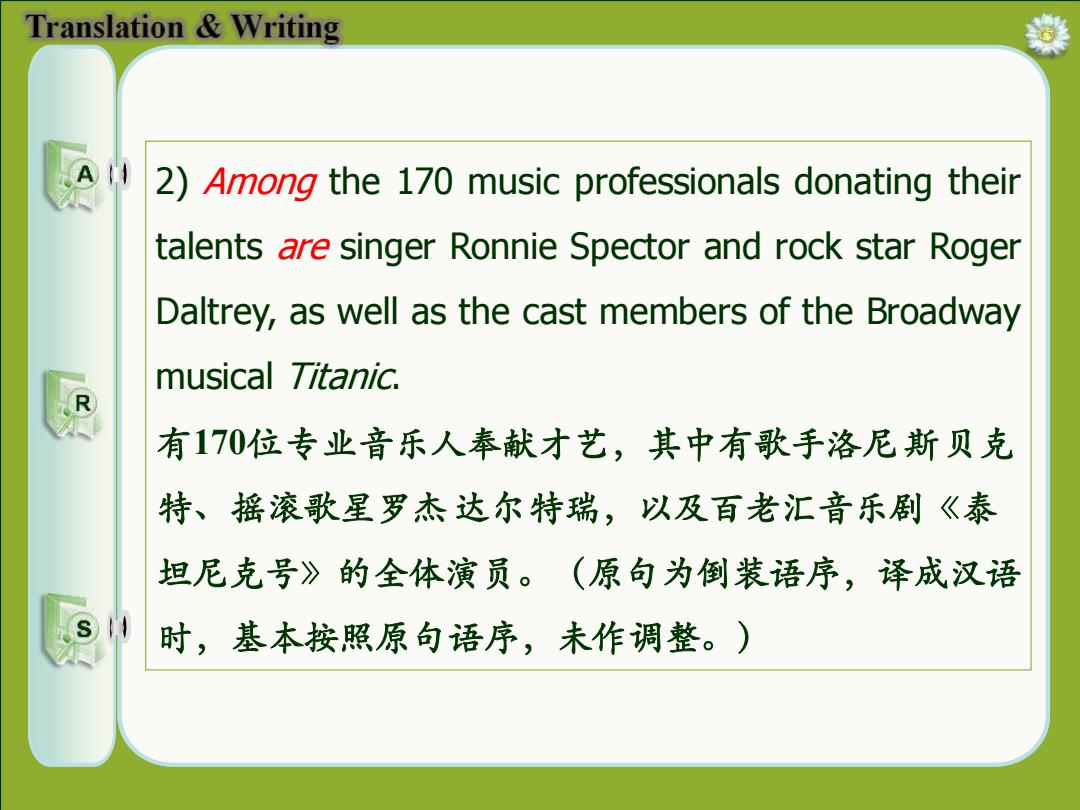
Translation Writing A 2)Among the 170 music professionals donating t their talents are singer Ronnie Spector and rock star Roger Daltrey,as well as the cast members of the Broadway musical Titanic. 有170位专业音乐人奉献才艺,其中有歌手洛尼斯贝克 特、摇滚歌星罗杰达尔特瑞,以及百老汇音乐剧《泰 坦尼克号》的全体演员。(原句为倒装语序,译成汉语 时,基本按照原句语序,未作调整。)
2) Among the 170 music professionals donating their talents are singer Ronnie Spector and rock star Roger Daltrey, as well as the cast members of the Broadway musical Titanic. 有170位专业音乐人奉献才艺,其中有歌手洛尼斯贝克 特、摇滚歌星罗杰达尔特瑞,以及百老汇音乐剧《泰 坦尼克号》的全体演员。(原句为倒装语序,译成汉语 时,基本按照原句语序,未作调整。)
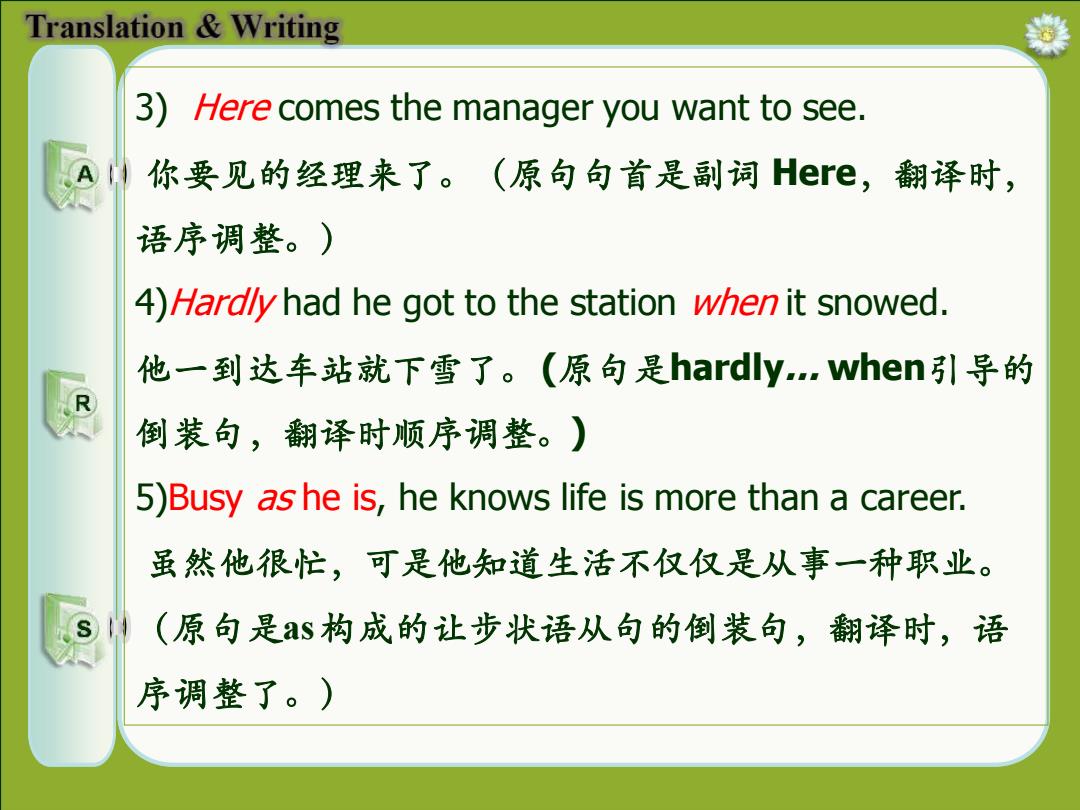
Translation Writing 3)Here comes the manager you want to see. 你要见的经理来了。(原句句首是副词Here,翻译时, 语序调整。) 4)Hard/y had he got to the station when it snowed. 他一到达车站就下雪了。(原句是hardly..when引导的 倒装句,翻译时顺序调整。) 5)Busy as he is,he knows life is more than a career. 虽然他很忙,可是他知道生活不仅仅是从事一种职业。 (原句是as构成的让步状语从句的倒装句,翻译时,语 序调整了。)
3) Here comes the manager you want to see. 你要见的经理来了。(原句句首是副词 Here,翻译时, 语序调整。) 4)Hardly had he got to the station when it snowed. 他一到达车站就下雪了。 (原句是hardly… when引导的 倒装句,翻译时顺序调整。) 5)Busy as he is, he knows life is more than a career. 虽然他很忙,可是他知道生活不仅仅是从事一种职业。 (原句是as 构成的让步状语从句的倒装句,翻译时,语 序调整了。)
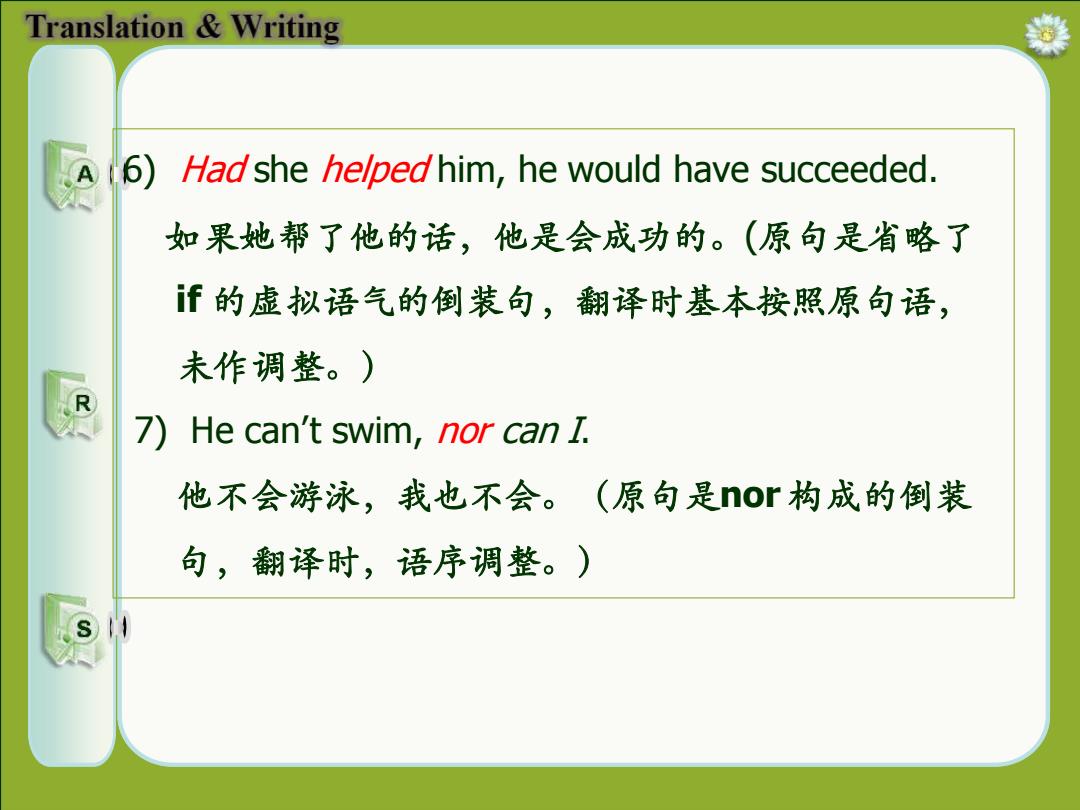
Translation Writing 6)Had she helped him,he would have succeeded. 如果她帮了他的话,他是会成功的。(原句是省略了 f的虚拟语气的倒装句,翻译时基本按照原句语, 未作调整。) 7)He can't swim,nor can I. 他不会游泳,我也不会。(原句是or构成的倒装 句,翻译时,语序调整。)
6) Had she helped him, he would have succeeded. 如果她帮了他的话,他是会成功的。(原句是省略了 if 的虚拟语气的倒装句,翻译时基本按照原句语, 未作调整。) 7) He can’t swim, nor can I. 他不会游泳,我也不会。(原句是nor 构成的倒装 句,翻译时,语序调整。)